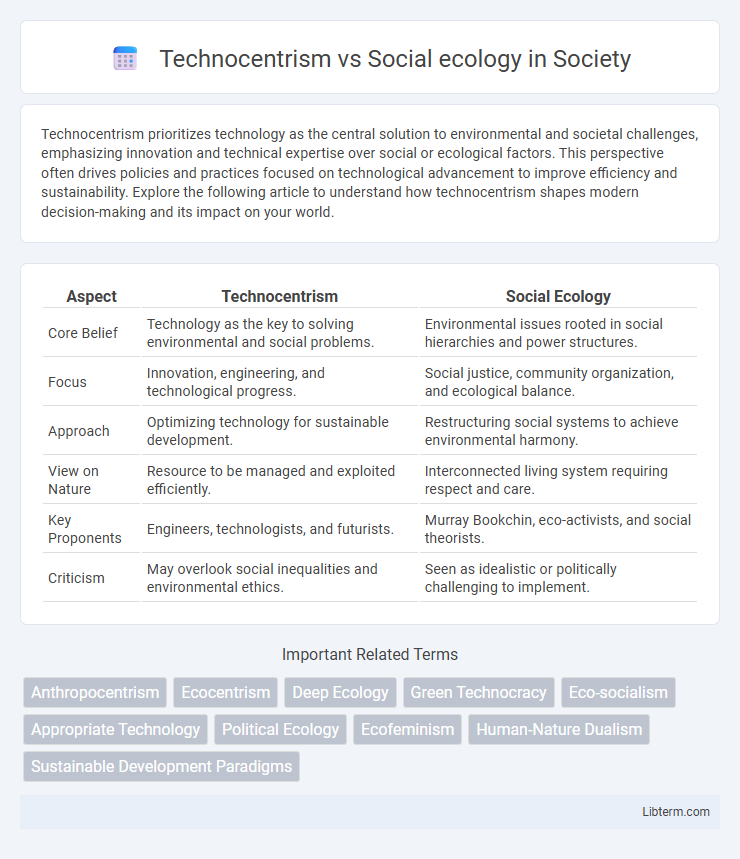Technocentrism prioritizes technology as the central solution to environmental and societal challenges, emphasizing innovation and technical expertise over social or ecological factors. This perspective often drives policies and practices focused on technological advancement to improve efficiency and sustainability. Explore the following article to understand how technocentrism shapes modern decision-making and its impact on your world.
Table of Comparison
| Aspect | Technocentrism | Social Ecology |
|---|---|---|
| Core Belief | Technology as the key to solving environmental and social problems. | Environmental issues rooted in social hierarchies and power structures. |
| Focus | Innovation, engineering, and technological progress. | Social justice, community organization, and ecological balance. |
| Approach | Optimizing technology for sustainable development. | Restructuring social systems to achieve environmental harmony. |
| View on Nature | Resource to be managed and exploited efficiently. | Interconnected living system requiring respect and care. |
| Key Proponents | Engineers, technologists, and futurists. | Murray Bookchin, eco-activists, and social theorists. |
| Criticism | May overlook social inequalities and environmental ethics. | Seen as idealistic or politically challenging to implement. |
Introduction to Technocentrism and Social Ecology
Technocentrism emphasizes technology as the primary solution for environmental problems, prioritizing scientific innovation and engineering advancements to promote sustainability. Social ecology critiques this approach by highlighting the need to address underlying social hierarchies and inequalities that contribute to ecological degradation. The interplay between technocentrism's reliance on technical fixes and social ecology's focus on systemic social change defines the core debate in environmental philosophy.
Defining Technocentrism: Core Principles and Beliefs
Technocentrism centers on the belief that technological innovation and scientific progress are the primary solutions to environmental and societal challenges, emphasizing human control over nature through engineering and technological advancements. It views technology as an inherently positive force capable of optimizing resource utilization, increasing efficiency, and promoting economic growth while addressing ecological concerns. Core principles include reliance on technological expertise, faith in human ingenuity, and the prioritization of technological development as a pathway to sustainability.
Social Ecology Explained: Foundations and Key Ideals
Social ecology is a framework emphasizing the connection between social issues and environmental problems, positing that ecological crises stem from hierarchical and capitalist social structures. Founded by Murray Bookchin, it advocates for decentralized, direct democratic communities as essential to achieving ecological balance and social justice. Key ideals include the dismantling of domination in human relationships, the integration of ecological principles in social organization, and the promotion of cooperative living to restore harmony between society and nature.
Historical Context: Evolution of Environmental Thought
Technocentrism emerged during the Industrial Revolution, emphasizing technological innovation as the primary solution to environmental challenges by harnessing scientific progress for resource management. In contrast, Social Ecology arose in the 1960s and 1970s through thinkers like Murray Bookchin, critiquing hierarchical social structures and advocating for ecological sustainability rooted in social justice and community-based environmental stewardship. These paradigms reflect divergent historical responses to environmental degradation, with Technocentrism focusing on control and efficiency, while Social Ecology stresses systemic social change and decentralized ecological balance.
Technocentrism’s Approach to Environmental Problems
Technocentrism addresses environmental problems by emphasizing technological innovation and scientific expertise to develop sustainable solutions, such as renewable energy systems and pollution control technologies. It promotes the belief that human ingenuity and advanced technology can manage and mitigate ecological challenges without fundamentally altering economic or social structures. This approach often prioritizes efficiency and resource optimization, leveraging engineering advancements to balance environmental protection with ongoing industrial progress.
Social Ecology’s Critique of Technological Solutions
Social Ecology critiques technocentrism by emphasizing that technological solutions often overlook underlying social and environmental issues, leading to unsustainable outcomes. It argues that relying solely on technology perpetuates hierarchical systems that cause ecological degradation. Instead, Social Ecology advocates for addressing social structures and promoting community-based, ecological approaches to achieve genuine environmental sustainability.
Human-Nature Relationships: Contrasting Perspectives
Technocentrism emphasizes human dominance over nature through technological innovation, advocating that scientific progress and engineering can solve environmental challenges. Social ecology critiques this approach, asserting that ecological problems stem from hierarchical social structures and calls for a harmonious relationship between humans and the natural world rooted in social justice. These contrasting perspectives highlight differing views on whether human control or social reform is key to addressing environmental issues.
Societal Implications of Technocentrism vs. Social Ecology
Technocentrism emphasizes technological innovation as the primary solution to environmental and societal challenges, often prioritizing economic growth and efficiency. Social ecology critiques this approach by highlighting the importance of addressing social hierarchies, community organization, and ecological sustainability simultaneously. The societal implications of technocentrism may include increased dependency on technology and potential environmental risks, whereas social ecology advocates for systemic social change fostering equitable resource distribution and environmental justice.
Case Studies: Real-World Outcomes of Both Approaches
Technocentrism in case studies often showcases large-scale projects such as Singapore's water management system, which relies heavily on technology-driven solutions like NEWater for sustainable resource use. Social ecology approaches are exemplified by community-led watershed management in Kerala, India, where local participation emphasizes ecological balance and social justice over purely technical fixes. Comparative analysis reveals technocentrism drives rapid infrastructure development but may overlook social equity, while social ecology fosters inclusive, adaptive management often resulting in long-term resilience and community empowerment.
Future Prospects: Toward Sustainable Environmental Solutions
Technocentrism emphasizes innovative technological advancements as key to achieving sustainable environmental solutions, prioritizing efficiency, renewable energy, and smart infrastructure. Social ecology advocates for systemic social change, addressing environmental issues through community empowerment, equity, and decentralized decision-making. Integrating both perspectives could foster resilient futures by combining advanced technologies with inclusive, socially-driven environmental practices.
Technocentrism Infographic

 libterm.com
libterm.com